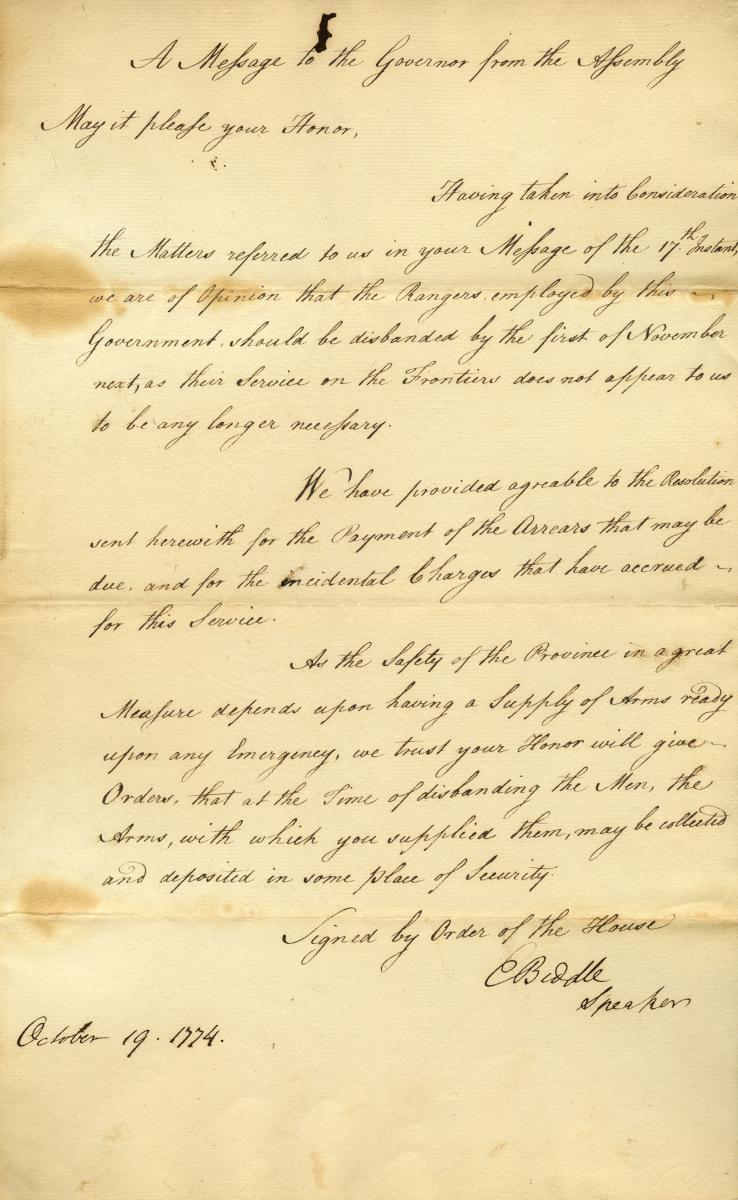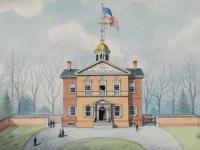While the end of October usually brings to mind images of ghosts, goblins, and trick-or-treaters, it’s fitting to remember that it also brought about the conclusion of a momentous event over 200 years ago. From September 5 through October 26, 1774, the First Continental Congress was held here in Philadelphia. It laid the foundation for the future War of Independence from Britain, as well as the beginnings of a separate American institution of government. Among the list of Pennsylvania’s representatives are well known names such as George Ross, Thomas Mifflin, and John Dickinson, however one influential representative, Edward Biddle, has often been overshadowed by more well-known attendees.
The Biddle Family of the Delaware Valley has played a major role in the history of the area and of the United States. From Commodore James Biddle who served in the war against the Barbary pirates, to Clement, Nicholas, Charles, and others, members of the Biddle family were involved in military, financial, and political circles throughout the American Civil War and beyond.
As early as 1757, Edward Biddle was in the Provincial army during the French & Indian  War. He had a successful military career, advancing in rank from Ensign to Captain, and received five thousand acres of land after his retirement. He was present at the taking of both Fort DuQuesne and Fort Niagara. After leaving the military, Biddle became a lawyer in Reading and was a member of the Pennsylvania Assembly. He was elected to Speaker of the Assembly on October 15, 1774, replacing Joseph Galloway. As Speaker, on October 19th, 1774, he wrote a “Message to the Governor from the Assembly” in regard to disbanding the Frontier Rangers. He goes on to note that to ensure the safety of the Province, he requested their arms and supplies be “deposited in some place of security.”
War. He had a successful military career, advancing in rank from Ensign to Captain, and received five thousand acres of land after his retirement. He was present at the taking of both Fort DuQuesne and Fort Niagara. After leaving the military, Biddle became a lawyer in Reading and was a member of the Pennsylvania Assembly. He was elected to Speaker of the Assembly on October 15, 1774, replacing Joseph Galloway. As Speaker, on October 19th, 1774, he wrote a “Message to the Governor from the Assembly” in regard to disbanding the Frontier Rangers. He goes on to note that to ensure the safety of the Province, he requested their arms and supplies be “deposited in some place of security.”
At the First Continental Congress, through the efforts of Edward Biddle, Pennsylvania received the credit for being the “first constitutional House of Representatives” in the Colonies to ratify the acts of the General Congress. Biddle continued to serve the cause of liberty as a member of the Committee of Safety from June30, 1775, through July 22, 1776, and once again as a representative to the Assembly in 1778.
Regrettably Biddle suffered a debilitating accident on January 23, 1775, on his way from Reading to Congress, falling overboard into the Schuylkill River. Sleeping in wet clothes, he acquired a cold and a form of inflammatory rheumatism that aided in bringing about a deterioration of his health and the loss of sight in one of his eyes. Edward Biddle’s last act of service was that as a member of a committee of four, appointed on February 5, 1779, “to bring in a bill for abolishing slavery in Pennsylvania.”
Ironically, Edward Biddle expired on September 5, 1779, five years to the day from when he had first begun serving as a delegate from Pennsylvania to the First Continental Congress. James Read (or Reed), President of the Supreme Executive Council for Pennsylvania, would remark how, “As a public character very few were equal to him in talents or noble exertion of them…Love to his country, benevolence, and every manly virtue rendered him an object of esteem and admiration to all that knew him.”

